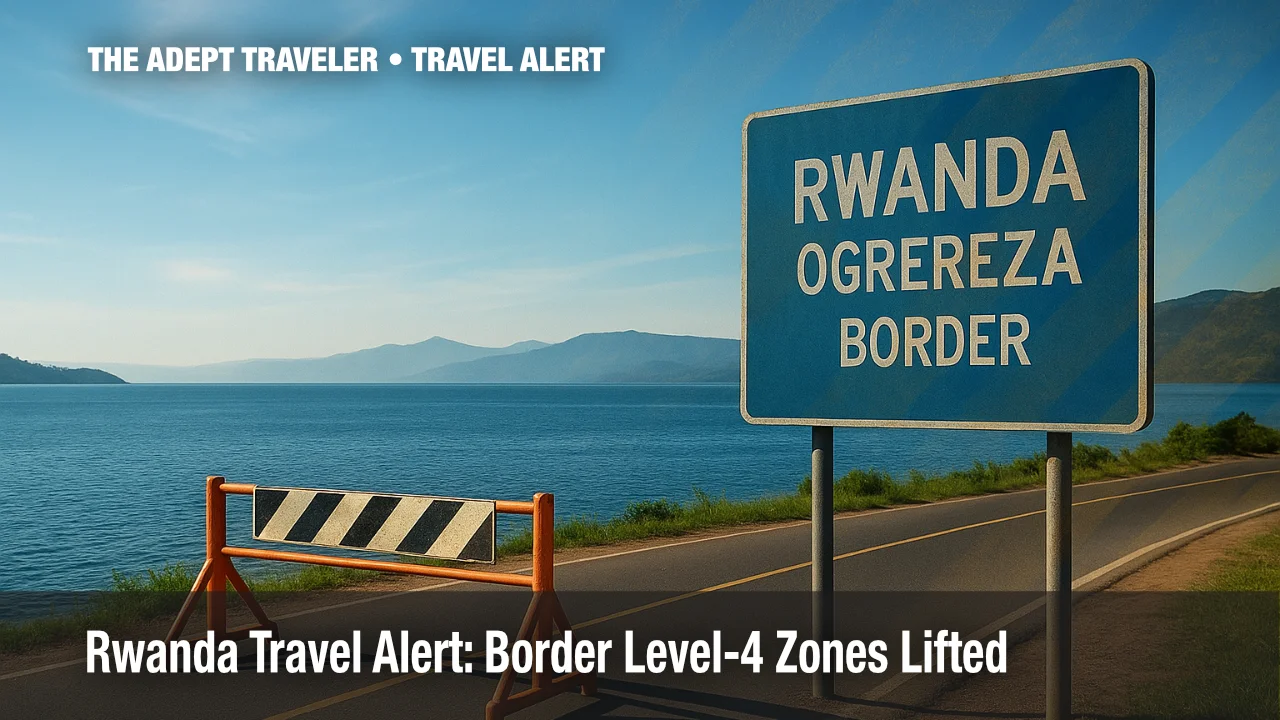Rwanda has been downgraded to a single nationwide Level 2 "Exercise Increased Caution" advisory after the U S State Department lifted its Level 4 "Do Not Travel" warning for border areas with Burundi and the Democratic Republic of the Congo (DRC) on Jul 16 2025. This Rwanda travel alert means the strictest U S restrictions now apply only within neighboring countries, not inside Rwanda. Travelers should still monitor official updates and maintain heightened Rwanda safety awareness near international frontiers.
At-a-Glance Severity: Warning, Affected Area: Rwanda nationwide (former border hotspots), Effective: Jul 16 - Ongoing 2025
Key Points
- Border Level-4 zones with Burundi and the DRC removed.
- Armed incidents still possible in Rusizi and Rubavu districts.
- Impact on travelers: Greater route flexibility, yet caution urged near borders.
- Kigali International Airport operating normally; no carrier changes announced.
- Limited consular help in remote border posts.
What Is Happening - Rwanda Travel Alert
On Jul 16 2025 the U S Department of State lowered its highest-risk designations for areas along Rwanda's western and southern borders. The change follows a six-month decline in cross-border militia incursions and improved patrol coordination with regional forces. Rwanda now holds a uniform Level 2 status, citing potential for isolated armed violence rather than widespread conflict. While the Rusizi and Rubavu districts remain sensitive, restrictions have relaxed, giving tour operators confidence to resume circuits to Lake Kivu and Nyungwe Forest. Neighbouring provinces inside the DRC and Burundi continue to face security threats, so border security checkpoints may close without notice.
Official Guidance
U S officials advise maintaining Rwanda safety precautions, especially within ten kilometers of the DRC frontier and at remote lakeside ports. Avoid night road travel outside Kigali, stay on primary highways, and register your itinerary with the Smart Traveler Enrollment Program. The Rwandan National Police require vehicle roadblocks to be respected; carry passports at all times. Trekking permits for Volcanoes and Nyungwe National Parks now include an emergency evacuation surcharge of RWF 7,500 (about USD 6). Visas on arrival remain available for most nationalities, but the US Embassy warns processing can slow if military operations flare across the border. Commercial flights via Kigali International continue on schedule, with no rerouting obligations announced by RwandAir or the major alliances.
Practical Steps
- Recheck Travel Insurance to confirm armed-conflict coverage extends to western Rwanda; add an evacuation rider if absent.
- Build itineraries that allow rerouting through Huye or Musanze should border security closures occur.
- Use licensed guides for forest treks; verify they hold satellite phones and first-aid kits.
- Keep Hotel in Kigali as a safe staging point and leave copies of documents with reception.
- Store emergency cash in small USD bills for checkpoints or fuel when card terminals fail.
- Register with your embassy and save contacts for the U S Embassy Kigali, (+250) 252 596 400, and Rwanda National Police, 112.
- Monitor live updates on the Global Travel Alerts hub before each movement.
Final Thoughts
The downgrade opens Rwanda's scenic west to cautious exploration, yet vigilance is essential. Stick to daylight drives and monitor official updates to keep your trip on track. Travel regulations can change rapidly. Confirm requirements with official channels before departure.

